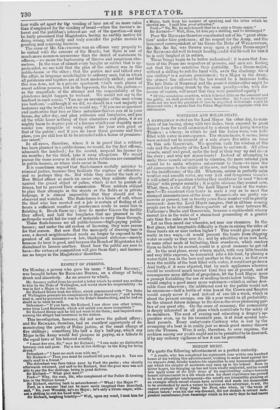WHERRIES AND STEAM-BOATS.
A GENTLEMAN waited on the Lord Mayor the other day, to com- plain of his having, along with two ladies, been exposed to great danger from the swell occasioned by a steam.boat going down the Thames : a wherry, in which he and the ladies were, was half- filled with water in consequence. The steam-boats, it seems, have been ordered not to proceed at a rate above five miles an hour on this side Greenwich. We question both the wisdom of the rule and the authority of the Lord Mayor to enforce it. All other vessels, small and great, make the best of their way up and down the river ; and why not steam-boats ? Instead of attempting to make these vessels subservient to wherries, the more rational plan would be to make wherries subservient to them—to raise the old conveyance to the utility of the new, not bring. down the new to the insufficiency of the dd. Wherries, unless in perfectly cairn weather and smooth water, are very frail and dangerous vessels : it will admit of a question whether they could ever be used " below bridge" with proper security ; it is quite obvious they cannot now. What, then, is the duty of the Lord Mayor? what of the water- men ?—To construct their boats in such a way as to meet the changed circumstances of the river. Steam-boats are pretty nu- merous at present, but in twenty years their number will be greatly increased : does the Lord Mayor imagine, that in all time coming people are to be detained three-quarters of an hour between St. Catherine's Docks and Greenwich, because a cockle-shell wherry cannot live in the wake of a steam-boat proceeding at a greater rate than five miles an hour ?
Let us then mend our wherries, not mar our steamers. In the first place, what imaginable difficulty is there in raising the sides of these boats six or nine inches higher ? This would give great se- curity in two ways,—it would prevent the boats from shipping water so easily as they now do ; and by admitting of an iron, keel, or some other mode of ballasting, their crankness,- which renders them so liable to be overset, would in a great measure be got rid of. In the next place, every wherry might, with very little trouble and very little expense, be converted into a life-boat, by placing a water-tight box in the bow and another in the stern;. so that even were the middle of the boat filled with water, it would-not go down And lastly, if it were objected, that by such appliances wherries would be rendered much heavier than they are at present, and of consequence more difficult of propulsion, let the Lord Mayor issue a precept forbidding the use of sculling-boats below bridge. This would employ a good many more watermen—which is rather desi- rable than otherwise ; the additional cost to the public would not be enormous—half a bottle of wine less at the Crown and Sceptre would amply cover it ; and instead of one life a week, which is about the present average, one life a year would in all probability. be the utmost future damage to the down-the-river pleasuring par- ties of our great city. On the score of economy, the community is deeply interested in all plans which contribute to the safety of its members. The cost of rearing and educating a draper's ap- prentice even, up to his twentieth year, is at least several hun- dred pounds. Every unfortunate Cockney who is lost by the swamping of a boat is in reality just so much good money thrown into the Thames. Were it only, therefore, to save expense, the reckless among our youth ought not to be permitted to be drowned, if by any ordinary vigilance of law it can be prevented.


























 Previous page
Previous page